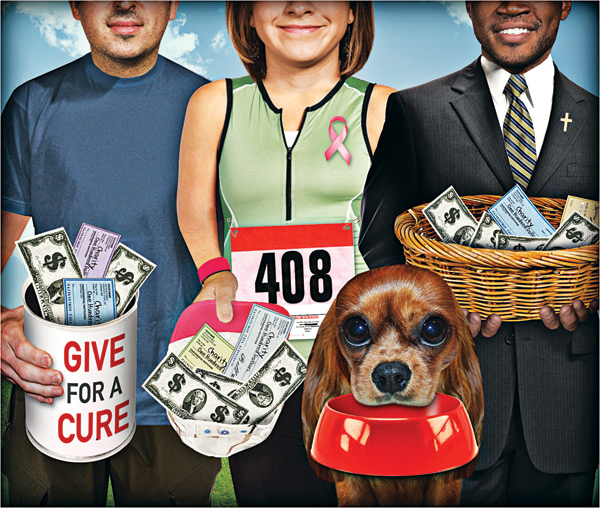Charity’s Foot Soldiers
 Illustration by John Ueland
Illustration by John Ueland
Come midsummer, I’m utterly exhausted by charity races. Not from running them — from the constant barrage of fundraising e-mails I get from everyone I’ve ever met. One friend ran the Boston Marathon to support a local arts organization. Another is doing a 5K walk for the National Multiple Sclerosis Society. Someone else is organizing a 10K to support the athletic programs at a high school. All good causes, but every year there’s a new race…or 10. With all those e-mail pleas, obnoxious vest-wearing college kids soliciting money on the streets, sometimes-absurd “awareness” campaigns (is anyone not aware of breast cancer at this point?), and charity ribbons glaring out from the box of every processed food product, it’s hard to avoid the do-gooding.
So after my friends e-mail me a second or third time for their latest cause, I pull out my credit card and click away anywhere from $10 to $50. I do this because I like to maintain my relationships, want my money to go to a good cause, and feel guilty that I don’t give as much to charity as I should. The size of my donation is usually commensurate with how close a friend we’re talking about, how difficult a task they’re tackling, and how worthy a cause it is. (A college roommate biking 300 miles to raise money for lung cancer research earns a bigger donation than a distant cousin doing a 5K walk to stop prairie-dog eradication.) And you know what? After I hit “donate,” I get a momentary rush of happiness. I just helped cancer research! I should do this more often!
And then I’m distracted by a funny video that pops into my inbox, and I forget all about charity until I get another desperate electronic solicitation and the cycle of annoyance/guilt/joy starts all over again.
I’ll say it: Running a marathon and raising some money doesn’t really feel charitable. Sure, our noble fundraisers are helping a (probably) worthy cause, but they also have a host of ulterior motives: getting into shape, finishing an athletic event, socializing, and scoring schwag (who doesn’t love an “I’m a good person” T-shirt?). Which is why whenever I get an e-mail asking for money to help reach the $4,000 goal for a Boston Marathon charity racer, I can’t help but think, You just want to run the marathon, but weren’t fast enough to qualify! So now I’m supposed to pay to help get you in? And anyway, do you really need a big, pricey event to do something good? Whatever happened to anonymously writing a check like a good New Englander? Mother Teresa, charity racers are not.